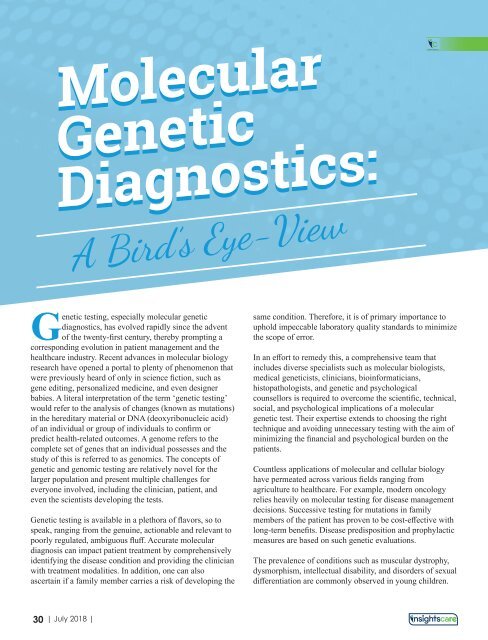The 10 Most Innovative Digital Healthcare Solution Providers 2018
Create successful ePaper yourself
Turn your PDF publications into a flip-book with our unique Google optimized e-Paper software.
Molecular<br />
Genetic<br />
Diagnostics:<br />
A Bird’s Eye-View<br />
Genetic testing, especially molecular genetic<br />
diagnostics, has evolved rapidly since the advent<br />
of the twenty-first century, thereby prompting a<br />
corresponding evolution in patient management and the<br />
healthcare industry. Recent advances in molecular biology<br />
research have opened a portal to plenty of phenomenon that<br />
were previously heard of only in science fiction, such as<br />
gene editing, personalized medicine, and even designer<br />
babies. A literal interpretation of the term ‘genetic testing’<br />
would refer to the analysis of changes (known as mutations)<br />
in the hereditary material or DNA (deoxyribonucleic acid)<br />
of an individual or group of individuals to confirm or<br />
predict health-related outcomes. A genome refers to the<br />
complete set of genes that an individual possesses and the<br />
study of this is referred to as genomics. <strong>The</strong> concepts of<br />
genetic and genomic testing are relatively novel for the<br />
larger population and present multiple challenges for<br />
everyone involved, including the clinician, patient, and<br />
even the scientists developing the tests.<br />
Genetic testing is available in a plethora of flavors, so to<br />
speak, ranging from the genuine, actionable and relevant to<br />
poorly regulated, ambiguous fluff. Accurate molecular<br />
diagnosis can impact patient treatment by comprehensively<br />
identifying the disease condition and providing the clinician<br />
with treatment modalities. In addition, one can also<br />
ascertain if a family member carries a risk of developing the<br />
same condition. <strong>The</strong>refore, it is of primary importance to<br />
uphold impeccable laboratory quality standards to minimize<br />
the scope of error.<br />
In an effort to remedy this, a comprehensive team that<br />
includes diverse specialists such as molecular biologists,<br />
medical geneticists, clinicians, bioinformaticians,<br />
histopathologists, and genetic and psychological<br />
counsellors is required to overcome the scientific, technical,<br />
social, and psychological implications of a molecular<br />
genetic test. <strong>The</strong>ir expertise extends to choosing the right<br />
technique and avoiding unnecessary testing with the aim of<br />
minimizing the financial and psychological burden on the<br />
patients.<br />
Countless applications of molecular and cellular biology<br />
have permeated across various fields ranging from<br />
agriculture to healthcare. For example, modern oncology<br />
relies heavily on molecular testing for disease management<br />
decisions. Successive testing for mutations in family<br />
members of the patient has proven to be cost-effective with<br />
long-term benefits. Disease predisposition and prophylactic<br />
measures are based on such genetic evaluations.<br />
<strong>The</strong> prevalence of conditions such as muscular dystrophy,<br />
dysmorphism, intellectual disability, and disorders of sexual<br />
differentiation are commonly observed in young children.<br />
30 | July <strong>2018</strong> |
















